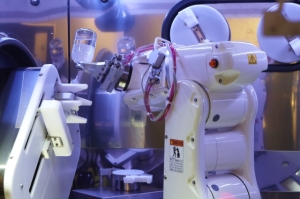by
Nancy Ryerson, Staff Writer | February 05, 2013

The i.v.STATION ONCO robot.
Mixing chemotherapy drugs is a high-risk and hazardous process, perhaps best suited for a certain kind of employee: robots. On January 29, 2013 Mercy Medical Center in Cedar Rapids, Iowa announced that it will be the first hospital in the country to install second-generation oncology robots from Health Robotics.
"The i.v. room is such a vulnerable area for health systems, because it's really such a manual process that relies on human intervention, and humans are humans," Desmond Waters, pharmacy director at Mercy Medical Center, told DOTmed News. "We chose the robots for the safety of the technology."
Mercy Medical Center already has a state-of-the-art cancer center, Waters said, where it produces 11,000 i.v. chemotherapy preparations each year. The hospital installed Health Robotics' non-chemotherapy drug mixing robots about a year ago, so Waters was excited when the company asked whether his hospital would like to be the first in the U.S. to install the i.v. STATION ONCO robot. The new robots automatically compound, cap and label soft plastic bags and syringes for chemotherapy drugs.
While Waters said Mercy Medical Center has never had an incident of medicine being mixed incorrectly, studies show mistakes are somewhat common, especially when patients take medicine at home.
Desmond Waters,
pharmacy director at Mercy Medical Center.
"It weighs the vial, takes a picture of the vial and weighs the bag to insure the exact concentration, the right vial, the right drug, the right dose, the right patient and the right time," said Waters.
Chemotherapy drugs are very patient-specific, Waters explained, making accuracy even more important. Using robots rather than people also protects hospital workers' health, as the drugs can irritate skin and have been found to be carcinogenic.
Though Health Robotics has installs around the world, the i.v. automation industry is only in beginning stages in the United States, according to a KLAS report. Waters said Mercy Hospital is in a national user group for Healthcare Robotics with two other hospital systems.
"We're one of very few hospitals [with i.v. robotics], but it is growing quickly," said Waters. "Just within my industry it's becoming a very, very hot topic."
Back to HCB News
